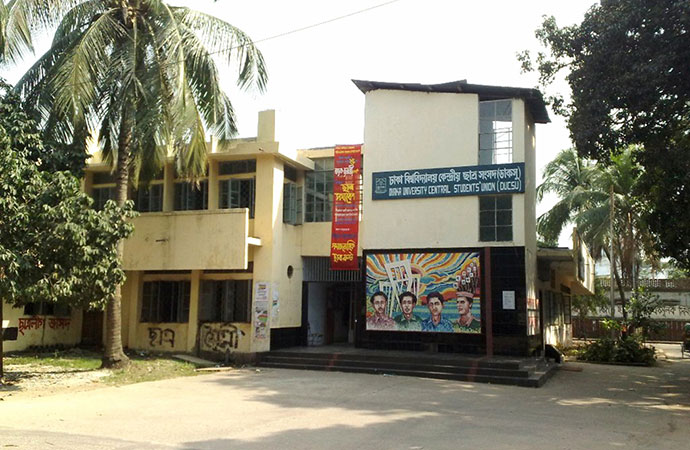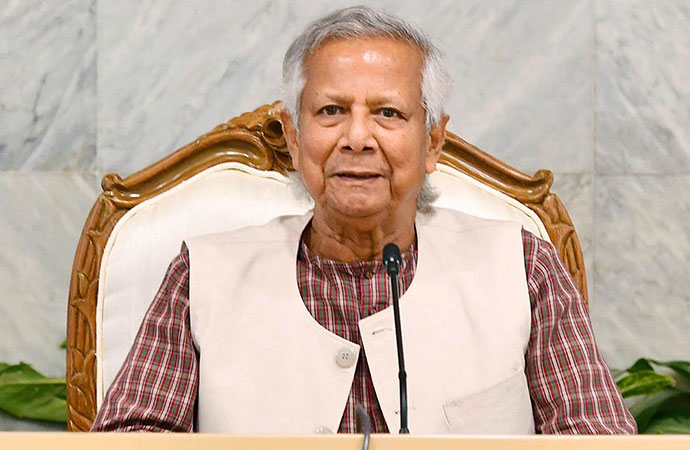Reportage

DUCSU (Dhaka University Central Students’ Union) building, Dhaka University. Photo: en.wikipedia.org
Towards the end of July, the highly anticipated date for elections to the Dhaka University Central Students' Union was announced, delivering on a key promise of the interim government to restart the culture of student politics centred around students' union elections at the country's leading public universities.
Accordingly DU will hold its first students' union election in 6 years on September 9. The final voter list containing 39,775 eligible voters, of which 20,871 are male and 18,902 are female, was published this week.
On August 8, the Dhaka University unit of the Jatiyatabadi Chhatra Dal, the BNP's student wing, sparked controversy by announcing convening committees for 18 residential halls, despite widespread opposition within the student body to the revival of hall-based politics following the July Uprising. Bangladeshis will recall the pivotal and absolutely critical date of July 17, 2024. On that day, in a sweeping escalation of the nationwide student movement, protesters expelled Bangladesh Chhatra League (BCL) activists from major public universities - including Dhaka University - and declared their campuses "free from politics."
It was a truly extraordinary turn of events. The previous day, blood had flowed for the first time since the start of the quota reform movement, with six people including Shaheed Abu Sayed, killed during nationwide protests that were met with fierce attacks allegedly carried out by ruling party affiliates, including BCL and Jubo League members. As of September 21, political activities by students and/or teachers and staff was "banned" in at least 33 higher education institutions in Bangladesh-19 public universities, four government colleges, and 10 government medical colleges. Students themselves demanded this ban, though some of them also think the ban is ill-judged and participation in "healthy politics" by students is essential.
A survey carried out by the Dhaka University Research Society (DURS), a voluntary body of student and faculty researchers, revealed that 83.8 percent of the students who participated in the survey opted for a total ban on campus politics. Another 16 percent wanted "reformed" student politics on campus, allowing activities with control. The survey was conducted between September 3-11 on 2,237 currently enrolled students.
The University Reform Initiative (URI), a platform of Dhaka University students that included some coordinators of the anti-discrimination student movement, put forward an eight-point proposal for reform, including prohibition of all forms of partisan politics in residential and academic areas on the Dhaka University campus and enabling all candidates to run independently in the DUCSU or hall union elections.
Dhaka University students protested at the vice-chancellor's residence, condemning the revival of hall politics after July's uprising. Protesters demanded the immediate withdrawal of the committees, arguing that DU students should only elect representatives through DUCSU elections, not serve political parties.
Similar protests occurred at Rokeya and Sufia Kamal halls. Umama Fatema, an anticipated DUCSU VP candidate, called the committees a "betrayal" of the July uprising, warning of "strong measures" if the committees are not halted.
The Bangladesh Democratic Student Council (BDSC) condemned the return of "authoritarian student politics," with Convener Abdul Qader noting that economically vulnerable students become "hostages" to hall politics. Despite post-uprising agreements banning political activities in halls, BDSC alleged that multiple organizations have formed secret committees, "completely disregarding student sentiment."
BDSC warned of strong resistance if oppressive practices resume and called for dialogue to establish a proper campus politics framework.
A leadership incubator
Through its long yet chequered history, DUCSU has authored some glorious chapters in the history of Bangladesh. From fiery speeches and protest rallies on the DU campus to the corridors of parliament, DUCSU's influence over the life of the nation has been unmistakable - not just as a student body, but as a breeding ground of leadership, courage and conscientious rights-based movements from its birth. As a leadership incubator, it shaped many prominent figures who began their political life through activism on the DU campus.
It is known that before the establishment of DUCSU, 'Hall Unions' were formed in the three founding halls of the university. Among these, the first 'Hall Union' was formed at Muslim Hall (Salimullah Muslim Hall). Later, a decision was made at a meeting of teachers held at Curzon Hall on December 1, 1922, to form a student union named 'Dhaka University Student Union' in the academic year 1923-24. Subsequently, in the academic year 1953-54, through an amendment of the constitution, the previous name was changed to the present form.
According to political analysts, several factors contribute to DUCSU's role in grooming national leaders. From the beginning, DUCSU has contributed to many democratic movements. Its political environment and students' active participation on issues make it a political incubator.
Dr. Rushad Faridi, assistant professor of economics at DU, said: "Any organisation is a place for developing leadership qualities. Various posts in DUCSU and the hall's unions are platforms for practicing and nurturing leadership. I wouldn't say only DUCSU is a place for producing leaders-any organisation, no matter how small, can serve as a ground for leadership development."
In its 104-year history, DUCSU elections have been held a total of 37 times. Among these, 29 were held during the British and Pakistan periods. Yet, according to the University Ordinance of 1973, DUCSU and hall union elections are supposed to be held every year.
Before the 2019 election that was won by Nurul Huq Nur, the last DUCSU election was held six months before the fall of the Ershad regime, in June 1990. Yet strangely, the advent of democracy on the national stage spelled doomsday for DUCSU and its equivalent bodies in the other public universities, as nearly all of them went into limbo around the same time. Why or how this was allowed to happen, is still worthy of deeper study.
One theory is that the university administrations failed to organise the elections under pressure from the ruling parties, or their student wings. Yet history tells us that when what would've been the first DUCSU election following the fall of Ershad was announced in 1994, it eventually couldn't be held due to opposition from the Chhatra League. It was the same again the following year. Whatever the reason may have been, one thing that almost everyone can agree on is that the absence of SU elections has a very negative impact on the overall standard of student politics.
"We know why elections are not held. One major reason elections have not taken place since the 1990s is that whichever party comes to power, its affiliated student organisations do not want elections as they already hold leadership positions on campus. They fear that if elections are held, leadership might pass into others hands. As a result, the campus ends up under the control of the ruling party. No work is then done to protect the interests of general students."
He added that the path for the development of new student leadership or those who want to engage in genuine politics gets blocked. "Consequently, we don't see any new energetic and mature politicians at the national level either. Thus, a culture of thuggery is practiced on campus, and this trend is reflected in national politics as well."
Years of Silence
In its 104-year history, DUCSU elections have been held a total of 37 times. Among these, 29 were held during the British and Pakistan periods. Yet, according to the University Ordinance of 1973, DUCSU and hall union elections are supposed to be held every year.
After the 1990 election, the last DUCSU election was held in 2019. There are allegations that due to pressure from the ruling party's student organisation and various quarters, the university administration could not organise the election. However, experts opine that there are harmful consequences of not holding the DUCSU election.
Rushad Faridi said that the absence of elections has a very negative impact. "We know why elections are not held. One major reason elections have not taken place since the 1990s (till 2019) is that whichever party comes to power, its affiliated student organisations do not want elections as they already hold leadership positions on campus. They fear that if elections are held, leadership might pass into others hands. As a result, the campus ends up under the control of the ruling party. No work is then done to protect the interests of general students."
He added that the path for the development of new student leadership or those who want to engage in genuine politics gets blocked. "Consequently, we don't see any new energetic and mature politicians at the national level either. Thus, a culture of thuggery is practiced on campus, and this trend is reflected in national politics as well."
How it can be different
A ban on campus student politics was first implemented by the country's leading tech institute, BUET, in the wake of Abrar Fahad's gruesome murder in 2019. Subsequently that was extended to many more campuses by the completely new reality of the July 17 settlement in 2024. It was the only way to spare our students the overbearing presence of Chhatra League, their absolute dominance and all of the ways in which it manifested, that only came out in the open for all to see with the murder of Abrar, in all our campuses. But it was not a permanent solution.
You cannot ban students from doing politics forever. The fall of the AL regime that bred the killers of Abrar is an ideal moment to bring it back, and to try and build it on a stronger foundation.
There is a way to do this. What Umama Fatema and others have always complained about is 'lejurbrittik chhatro rajneeti'. What she is getting at is student politics or political organisations that are essentially reduced to youthful goon squads for the national political parties. They have no politics of their own, and work to simply fulfill the agenda of their 'mother' organisations.
One of the glaring flaws of the post-1991 settlement was precisely this. How else can you explain that the DUCSU elections stopped happening with the advent of democracy in 1991? Before the Nur election in 2019, the last DUCSU election was held in June 1990, six months before the fall of Ershad. The picture is remarkably similar in all the other public universities. Rajshahi, Chittagong, etc. Give or take a year or two, they all stopped happening at the same time.
In the absence of student union elections, the campus-based organisations all became extensions of their national mother parties, and their dominance or otherwise on campuses came to reflect the national equation in politics. When BNP was in power at the centre, Chhatra Dal was the dominant force on campuses. When Awami League won the general election, almost immediately Chhatra League became ascendant. After 2009, over the course of AL's 15-year rule at the centre, as it grew more and more authoritarian, Chhatra League grew more and more monstrous on campuses. By the end, the malign influence of Chhatra League on campuses, together with their increased use as a goon squad for political 'showdowns', etc, by AL was the single-worst aspect of the regime. Campus politics became more and more hollowed out, till banning student politics altogether became the only option to try and deal with Chhatra League.
If however it can be ensured that student politics around students' issues will be allowed to thrive on campuses, and regular SU elections would be a step towards that, we can start to ease politics back on campuses. Political party reform has not been on the agenda in the post-Aug 5 paradigm. It's something we may ultimately regret, but it's not too late yet, and one of the reforms that can be pushed for in the next parliament could be less of a direct relationship between national parties and their student fronts. Legislate to dilute the relationship, such that the leaders of the student fronts are not appointed from on high, by the leaders of their mother parties. These should be elected posts.
That is why I support the IG's decision to hold the elections to as many of the SU's as possible during its tenure. The DUCSU elections are set for September 9. In 1994 and 1995, the DUCSU elections were announced but couldn't be held due to opposition from AL/BCL. It was the period when Sheikh Hasina and co were raising hell against the BNP govt at the centre around the demand for caretaker, and we can easily guess that Chhatra League leadership acted in line with the party's high command. Watch out for who is in favour of the DUCSU elections (and some others that have been announced, RUCSU is one) and who isn't this time. It can be a very pertinent indicator of people's intentions going forward.
Meanwhile a committee has been formed to recommend a comprehensive framework for student politics at Dhaka University. The committee has been approved by DU Vice-Chancellor Dr Niaz Ahmed Khan, the university's Public Relations Department said on Thursday. The decision follows strong student reactions on August 8 regarding partisan politics at the residential hall level. In response, the university authorities held a discussion on August 10 with active student organisations on campus.
Building on that dialogue, the proposal to form a dedicated committee was put forward during the SMT (Statutory Meeting of Teachers) held on August 11. The aim of this committee is to engage with student bodies and stakeholders to foster a culture of democratic practice while ensuring a conducive academic environment. The committee will draft recommendations outlining the constructive role of traditional student politics at Dhaka University.
The members of the committee are Professor Dr Mohammad Siddiqur Rahman Khan, Dean of the Faculty of Arts (Convener), Dr Abdullah-al-Mamun, Provost of Salimullah Muslim Hall, Professor Dr Md Nazmul Hossain, Provost of Freedom Fighter Ziaur Rahman Hall, Professor Dr Aleya Begum, Provost of Sheikh Fazilatunnesa Mujib Hall, Professor Dr Mohammad Nazmuzzaman Bhuiyan, Department of Law. The committee is expected to submit its recommendations at the earliest time.
Leaders of various student organisations have said student politics based on party allegiance must stop, not the student politics per se. They also insisted that the student union-based politics must continue at the higher education institutions to establish the rights of students. By opposing the JCD committees in the halls, the students are not contradicting themselves. They are merely setting the new boundaries for how far politics should intrude into their lives.

























Leave a Comment
Recent Posts
Religion and Politics: A Toxic ...
At Dhaka University, cafeteria workers have been told not to wear shor ...
Enayetullah Khan joins AsiaNet ...
AsiaNet’s annual board meeting and forum was held in Singapore, ...
In a New York minute
Many leaders back a UN call to address challenges to ..
Defaulted loans at Non-Bank Financial Institutions ( ..
How the late Zubeen Garg embodied cultural affinitie ..